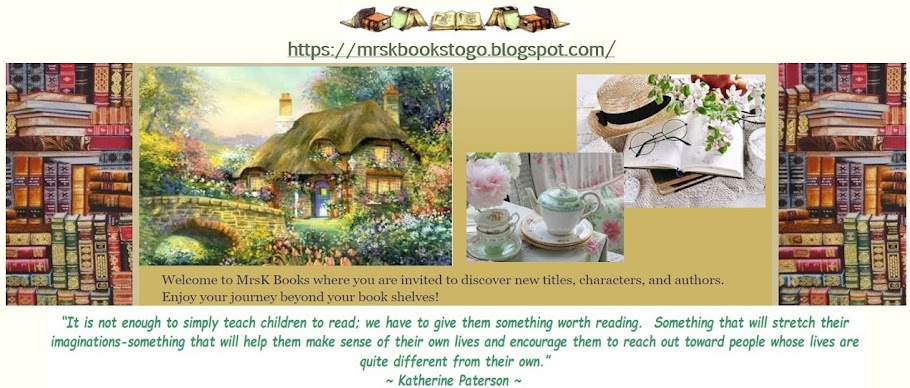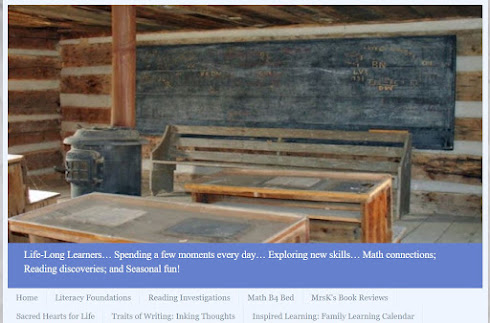Click the title above to follow the link to the article....
Summer Reading 2009,
I just read an article about these amazing women who delivered books to those without during the 1930's. Very inspirational, can you imagine no school or public libraries? What have so many done to get books in the hands of people around the world is beyond belief. If you need a good book for a summer evening, begin a journey with those who went beyond the call of literacy....
Just click on the links listed to preview some Librarians on the road......without a bookmobile!
- Home
- Reviewing Policy
- Seasonal Reading Connection
- Booked to Dine Book Club
- A "Classic" Foundation
- Beyond Your Bookshelves for Parents
- Read Alouds for Little Ones
- Brave Adventures for Pre-K-Homeschooling
- Toddler to Beginning Readers
- What Guys are Reading
- Watch, Listen, and Read
- Booked For Success: Inspired Learning
- Traits of Writing: Inking Thoughts
- Family Learning Calendar
- Sacred Hearts United for Life
- Celebrate Lit: MrsK's Reviews
Tuesday, June 16, 2009
Subscribe to:
Comments (Atom)
MrsK's Reading Bio
Reading is important! No questions asked, not even a blink of the eye from any student I grew up with. On the first day of the First grade, we were given our first books. Day two we all read aloud, round robin of course. Day three we were place in our first basal, now known as a lit circle group. Books were so important, publishers designed new curriculum so that every student was reading by the end of the first week. These early readers had images that looked like what we could see in the classroom, beyond the classroom, even on the big screen. Reading is important, throughout history every generation has believed that “Reading” opens up the world for endless possibilities.
I adore the 1950’s Dick and Jane books. Actually, most reading specialists and experienced (45+) educators believe that every student learned to read with Dick and Jane. Since these books are being re-issued, I have heard many parents, grandparents, and students claim that Dick and Jane stories of repetition does teach students to read.
Early influences from my mother influenced my desire to read. I would watch her read and we would go on “secret” excursions to the library. The library became my playground. I owned every book I could carry home, of course they needed to be taken back to their home after visiting with me for a week or two. My first book that I could pull off of the library shelf and read was, Father Bear Comes Home. I only saw my dad on Sundays for a few hours. I would pull this beginning reader off of the library shelf every week. Every week I would try to read the first chapter. Every week I got further in the story. My mom would let me check it out, only if I could read it myself (She didn’t like the illustrations therefore she didn’t want to take time to read it to me). One day, I pulled the book from the shelf and when mom came to get me from the children’s corner, I realized that I had read the whole story. I ran to the check out desk and the Librarian KERCHUNKED the checkout card. My mother, brother and neighbors read. My teachers read. We all read aloud all day long in school. The Priest read aloud every day at mass, even in Latin. Everybody in the Doctor’s office read. People on the bus read. Dad’s waiting in their cars as the Mom’s and children grocery shopped, read. In fact, once you could read and write, Sunset Magazine considered you a reader and sent you mail every day.
Reading is important; I’ve spent my life reading. I’ve traveled around the world and into space through books. My favorite genre is whichever book I have open at the time. Children’s Literature is my passion. Book clubbing is one of the best past times, especially if food is involved. In fact my friends of old are in a book club and we are about to embark on a beach trip to “read” and discuss our newest selection.
My “home-run” book story has helped every student find his or her own “home-run” reads. Every year, I have shared my, Father Bear Comes Home, and every year my students have brought in their “home-run” books. That’s the “diving board” into our Lit. Studies.
In “Growing Up Digital,” Tapscott’s insights into the new generations enthusiasm for the Net reminded me of my generation’s enthusiasm for reading, movies, TV, parties and our driving permits. The Net-Generation, as Tapscott describes, “are learning, playing, communicating, working, creating communities, and enforcing a social transformation.”
N-Geners are interactive “techies” who are always looking for a way to “work it” verses the TV Generation of “Baby Boomers” who started out looking for “how it works.” Reading development is tougher today, society moves too fast to invest their “non-working” free time into a book or even “home work.” Since I stepped into my own classroom, I have seen students being told to read, being forced to read, and threatened into reading. Homework is not any longer the vehicle for students to gain their future lifestyles or careers with. Yet, the Internet does create an enthusiasm for learning. Since I have been enrolled in these courses, I have used the computers in every subject. My students are using the newest technology in the classroom because I am giving them investigative sites to use as they learn from each other and books. I agree with Tapscott, in order to bridge the gap with this up and coming generation we must “live and learn with them.”
FTC Required Disclaimer: I receive these books from the publishers. I did not receive monetary compensation for these reviews. These reviews have been posted in compliance with the FTC requirements set forth in the Guides Concerning the Use of Endorsements and Testimonials in Advertising (available at ftc.gov/os/2009/10/091005revisedendorsementguides.pdf)

 2014
2014
I adore the 1950’s Dick and Jane books. Actually, most reading specialists and experienced (45+) educators believe that every student learned to read with Dick and Jane. Since these books are being re-issued, I have heard many parents, grandparents, and students claim that Dick and Jane stories of repetition does teach students to read.
Early influences from my mother influenced my desire to read. I would watch her read and we would go on “secret” excursions to the library. The library became my playground. I owned every book I could carry home, of course they needed to be taken back to their home after visiting with me for a week or two. My first book that I could pull off of the library shelf and read was, Father Bear Comes Home. I only saw my dad on Sundays for a few hours. I would pull this beginning reader off of the library shelf every week. Every week I would try to read the first chapter. Every week I got further in the story. My mom would let me check it out, only if I could read it myself (She didn’t like the illustrations therefore she didn’t want to take time to read it to me). One day, I pulled the book from the shelf and when mom came to get me from the children’s corner, I realized that I had read the whole story. I ran to the check out desk and the Librarian KERCHUNKED the checkout card. My mother, brother and neighbors read. My teachers read. We all read aloud all day long in school. The Priest read aloud every day at mass, even in Latin. Everybody in the Doctor’s office read. People on the bus read. Dad’s waiting in their cars as the Mom’s and children grocery shopped, read. In fact, once you could read and write, Sunset Magazine considered you a reader and sent you mail every day.
Reading is important; I’ve spent my life reading. I’ve traveled around the world and into space through books. My favorite genre is whichever book I have open at the time. Children’s Literature is my passion. Book clubbing is one of the best past times, especially if food is involved. In fact my friends of old are in a book club and we are about to embark on a beach trip to “read” and discuss our newest selection.
My “home-run” book story has helped every student find his or her own “home-run” reads. Every year, I have shared my, Father Bear Comes Home, and every year my students have brought in their “home-run” books. That’s the “diving board” into our Lit. Studies.
In “Growing Up Digital,” Tapscott’s insights into the new generations enthusiasm for the Net reminded me of my generation’s enthusiasm for reading, movies, TV, parties and our driving permits. The Net-Generation, as Tapscott describes, “are learning, playing, communicating, working, creating communities, and enforcing a social transformation.”
N-Geners are interactive “techies” who are always looking for a way to “work it” verses the TV Generation of “Baby Boomers” who started out looking for “how it works.” Reading development is tougher today, society moves too fast to invest their “non-working” free time into a book or even “home work.” Since I stepped into my own classroom, I have seen students being told to read, being forced to read, and threatened into reading. Homework is not any longer the vehicle for students to gain their future lifestyles or careers with. Yet, the Internet does create an enthusiasm for learning. Since I have been enrolled in these courses, I have used the computers in every subject. My students are using the newest technology in the classroom because I am giving them investigative sites to use as they learn from each other and books. I agree with Tapscott, in order to bridge the gap with this up and coming generation we must “live and learn with them.”
FTC Required Disclaimer: I receive these books from the publishers. I did not receive monetary compensation for these reviews. These reviews have been posted in compliance with the FTC requirements set forth in the Guides Concerning the Use of Endorsements and Testimonials in Advertising (available at ftc.gov/os/2009/10/091005revisedendorsementguides.pdf)



